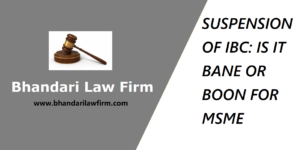Essentials of a Valid Contract Under Indian Contract Act 1872
To know the essentials of a valid contract under the Indian Contract Act, first, we have to know what is Contract: A contract is an agreement made between two or more parties, which is enforceable by law.
According to Section 2(h) of the Indian Contract Act,1872
“An agreement enforceable by law is a contract”.
A contract is valid and enforceable by law if it contains all the essentials of a valid contract.
What Agreements can be a Contract is mentioned in Section-10 of the Indian Contract Act,1872.
According to Section 10 of The Indian Contract Act,1872 “All agreements are contracts if they are made by the free consent of parties, competent to contract, for a lawful consideration and with a lawful object, and are not hereby expressly declared to be void.“
So, the essential elements of a valid contract are mentioned in Section 10 and there are more also.
The Essential Elements of a Valid Contract Are:
-
Presence of two parties
-
Agreement (offer & acceptance)
-
Free Consent
-
Competency of the parties
-
Lawful object and consideration
-
Not expressly declared to be void
-
Intention to create legal obligation
“We will discuss one by one to understand each essential of the contract”
Presence Of The Two Parties
There must be an agreement between the two parties. Two parties are a must for an agreement to be made. No party can alone make any agreement, there must be two parties present for any agreement to take place. A valid contract must at least involve two parties in a contract.
In the case of State of Gujarat Vs. Ramanlal & Co. AIR 1963 HC Ahmedabad Gujarat, In this case, on the dissolution of the firm Ramanlal & Co. , the assets of the firm were divided among the partners, the sales tax officer assessed the firm to sales tax on the ground that goods were allotted to partners and therefore liable to be taxed as if they were sold to the partners. It was held by the court that it was not a sale. The partners were joint owners of the assets so they cannot be both buyer and seller. As two parties to a contract are essential for a valid contract.
Agreement
An agreement is an outcome of offer and acceptance.
Offer + acceptance= Agreement
For a valid contract, there must be an offer and that offer should be accepted by the party to whom the offer is made.
For example- If A offers to sell his car to B for ₹05,00,000/- B accepts this offer, this is an agreement.
In Harvey Vs. Facey (1893) AC 552 Privy Council In this case Harvey sent a Telegram to Facey which stated: “Will you sell us Bumper Hall Pen? Telegraph lowest cash price-answer paid;“ Facey replied by telegram “Lowest price for Bumper Hall Pen 900 pounds.” Harvey then replied:- “We agree to buy Bumper Hall Pen for the sum of nine hundred pounds asked by you. Please send us your title deed in order that we may get early possession.” The Privy Council held that there was no contract concluded between the parties. Facey had not directly answered the first question, whether they would sell and the lowest price stated was a response to a request for information, not an offer. There was, thus, no evidence of an intention that the telegram sent by Facey was to be an offer.
Free consent Essentials of a Valid Contract
Section 14: states that consent is said to be free when it is not caused by:
-
Coercion Section 15
-
Undue influence section 16
-
Fraud Section 17
-
Misrepresentation section 18
-
Mistake Section 20,21 & 22
So free consent is an essential element for a valid contract and consent is free when it is not caused by coercion, undue influence, fraud, misrepresentation, and mistake.
In Manu Singh Vs. Umadat Pande (1890) Allahabad HC, On Facts, In this case, an old devotee gave his whole property to his spiritual leader. His spiritual leader asked him to give his entire property to have a good life etc. He then gave his entire property to his spiritual leader. In this case, the Hon’ble court held that property was transferred under the undue influence so this contract of transfer of property is void.
Competency Of the Parties Essentials of a Valid Contract
Section 11 of the Indian Contract Act, 1872 is: Who Are Competent To Contract — Every person is competent to contract who is
- of the age of majority according to the law to which he is subject, and who is
- of sound mind and is
- not disqualified from contracting by any law to which he is subject.
It refers to the fact that the person must be at least 18 years old or more. Further means that the party or the person should be able to understand the terms & conditions of the contract at the time of the formation of the contract. It states that the party should not be disqualified by any other law. For example, if the person is a convict, a foreign sovereign, or an alien enemy, etc., they may not enter into a contract.
So, basically the following persons are not competent to contract:
-
Minor Essentials of a Valid Contract
-
Unsound mind
-
Disqualified by law
(Click Here To Know About More About Indian Contract Act)
In the Case of Mohori Bibi Vs. Dharmodas Ghosh (1903) 30 Cal 539 (PC)According to the judgment of Trial Court, any mortgage deed or contract that was between the plaintiff and the defendant was void as it was accomplished by the person who was an infant at the time of execution of mortgage.
When Brahmo Dutta was not satisfied with the Trial Court he filed an appeal in the Calcutta High Court.
According to the decision of Calcutta High Court, they agreed with the decision that was given by Trial Court and it dismissed the appeal of Brahmo Dutta. Essentials of a Valid Contract
Then he later went to Privy Council for the appeal and later the Privy Council also dismissed the appeal of Brahmo Dutta and held that there cannot be any sought of the contract between a minor and a major person.
The final decision that was passed by the Council were:- Any contract with a minor or infant is void/ void ab-initio (void from beginning). Since minor was incompetent to make such a mortgage hence the contract made shall also be void and is not valid. The minor i.e. Dahrmodas Gosh cannot be forced to give back the amount of money that was advanced to him, because he was not bound by the promise that was executed in a contract.
Lawful Consideration And Object Essentials of a Valid Contract
Quid Pro Quo means ‘something in return’ which means that the parties must enter into agreement or contract with a lawful “consideration”
In Section 23 of the Act, the unlawful considerations are defined as all those which:
-
is forbidden by law. Essentials of a Valid Contract
-
is of such nature that, if permitted, it would defeat the provisions of any law, or is fraudulent.
-
involves or implies, injury to the person or property of another
-
the Court regards it as immoral or opposed to public policy
These conditions will make the agreement illegal.
There must be a lawful object of each agreement, it should not involve any illegal or forbidden act or thing. Parties must deal with doing a fair and legal action or work. Essentials of a Valid Contract
For example- parties must not do agreement for the sale of drugs and if they do so their agreement is void, not valid as drug sale and trade is banned and it’s dangerous and charges can be framed on them if caught for such act.
In the case of Sundara Gownder Vs. Balachandran AIR (1990)Kerala HC 324, In this case, the plaintiff is in default to payment to an organization due to which he was not allowed to bid in any auction, as it was known and declared that if any one is in default to the payment he/she can’t bid in any auction. So, here the plaintiff goes to the defendant and asks him to bid in the auction and get shops in his name and gave him money/consideration. But the defendant didn’t do as he said, so the plaintiff goes to court to get back money/ compensation. Court held that act which the plaintiff did, was forbidden by the provision of law, so, he will not get any compensation.
Agreements Expressly Declared To Be Void.
There are certain Agreements declared void by the Indian Contract Act, 1872 like
Agreements Void For Uncertainty
Contingent Contracts
Agreements To Do Impossible Acts Essentials of a Valid Contract
Intention To Create Legal Obligation.
There must be the intention of parties to create legal obligations. Family and friends don’t bind them under any legal obligation. Essentials of a Valid Contract
In the case of Balfour Vs. Balfour (1919) 2 KB 571, In this case, Mr. Balfour and his wife went to England for a vacation, and his wife became ill and needed medical attention. They made an agreement that Mrs. Balfour will remain behind in England the husband will return to Ceylon (Sri Lanka) and that Mr. Balfour would pay her £30 a month until he returned. This agreement was made while their relationship was fine. However, the relationship later soured and the husband stopped making the payments. The wife goes to court to enforce the agreement. Later the parties separated and were divorced. The wife brought this action for the money her husband had promised to pay to her but had failed to do so. Essentials of a Valid Contract
Court Held That A contract is not enforceable unless the parties intended the contract to create legal relations. Whether or not the parties intended to create legal obligation is determined by examining the circumstances existing at the time of execution of the contract. Whether promise made or not, it is between the parties to uphold it to their fullest potential. The parties cannot enforce and the judges who had made the decision concluded that the court cannot come into marital affairs and it is up to their full knowledge for solving their own problems.
Conclusion: As through the above-mentioned points we can conclude that if any agreement to be made a valid contract it must fulfill all the essentials of a valid contract mentioned above. The points mentioned above are very essential to make a valid contract.



